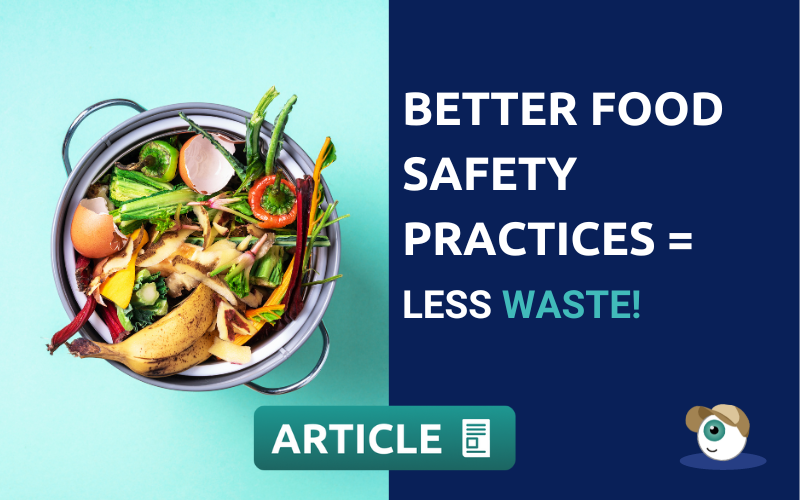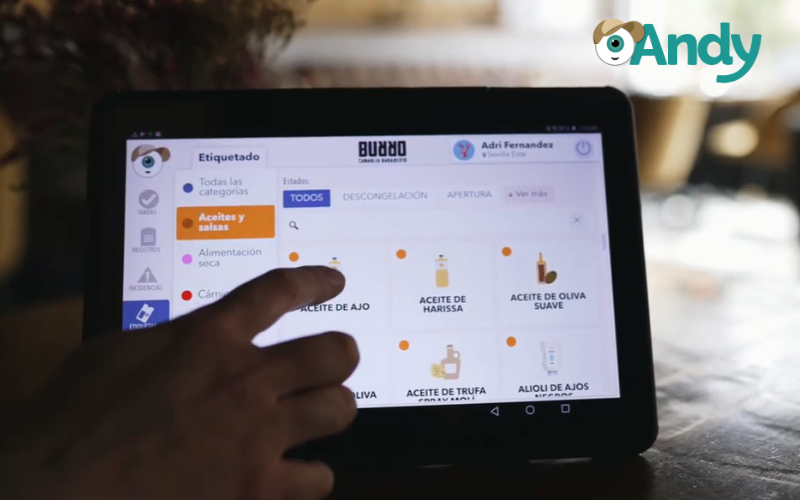Better Food Safety Practices in your Hospitality Business = Less Waste!

Have you ever considered the connection between food safety in your hospitality or foodservice business and food waste?
If your answer is NO, you’re not alone.
Many businesses in these sectors fail to fully grasp the clear and significant link between food safety control and waste in their kitchens.
However, it’s important to remember that well-implemented food safety practices not only protect public health but also play a crucial role in reducing food waste.
In this article, we’ll explore:
- how implementing best food safety practices can positively impact reducing waste in your restaurant or foodservice business,
- why this is crucial for both businesses and the environment, and
- how Andy helps you reduce all that waste that currently ends up where it shouldn’t: in the bin.
The Importance of Food Safety
Food safety ensures that the foods prepared, handled, and served in a commercial kitchen are safe for human consumption. It involves preventing, controlling, and eliminating risks and hazards that can cause foodborne illnesses, food poisoning, or other health issues related to food.
The significance of food safety in commercial kitchens lies in several fundamental factors:
Public Health: Food safety is a primary concern to protect public health. Consuming contaminated food can lead to severe illnesses, hospitalisations, and even death, especially among vulnerable populations such as children, the elderly, and individuals with weakened immune systems.
Reputation and Customer Trust: An incident of food poisoning or a food safety violation in a restaurant, restaurant chain, or foodservice business can severely damage its reputation. Customer trust is essential for the continued success of any food and beverage business.
Legal Compliance: Most countries and jurisdictions have strict regulations regarding food safety that must be adhered to. Violations of these regulations can result in fines, temporary or permanent business closures, and legal proceedings.
Economic Costs: Foodborne illnesses and other food safety issues can have significant economic costs for a business. This includes legal expenses, compensation to victims, loss of income due to restaurant closure, and the need for costly improvements to infrastructure and procedures.
Customer Satisfaction: Satisfied customers are more likely to return and recommend a restaurant to others. Ensuring food safety contributes to customer satisfaction by providing a safe and enjoyable dining experience.
Business Ethics: Food safety is an ethical issue in the restaurant industry. Owners and managers have a responsibility to ensure that the food they serve is safe and of high quality.
To ensure food safety in commercial kitchens, strict hygiene and food safety protocols must be followed. This includes maintaining safe food handling practices, controlling storage and cooking temperatures, providing proper staff training, and implementing food safety monitoring and record-keeping systems.
Regular inspections and oversight are essential to maintaining high food safety standards and protecting consumer health
The Connection Between Food Safety and Food Waste
Food safety and food waste are intrinsically linked in the food and restaurant industry, and their proper management is essential to ensure consumer safety and operational efficiency.
Let’s explore in detail the connection between these two key aspects:
Quality Control and Expiry Dates
Food safety involves ensuring that food is stored, prepared, and served safely for human consumption. This includes verifying that the food is not expired or in poor condition. When food does not meet safety standards, it must be discarded to avoid health risks, often resulting in food waste.

Prevention of Foodborne Illnesses
Improper food handling or the presence of pathogens in ingredients can lead to foodborne illnesses. To prevent this, it is essential to discard any food suspected of being contaminated, contributing to food waste.
Excess Purchasing and Inefficient Storage
To ensure the availability of fresh and safe ingredients, restaurants often overpurchase. Inefficient food storage or a lack of inventory monitoring can lead to ingredients expiring or becoming damaged, increasing waste.
Food Waste and Economic Losses
Food waste is costly for restaurants as it involves purchased but unused food. Economic losses related to food waste can impact the business’s profitability.
Reputation and Customer Trust
When customers witness food waste or learn about food safety issues in a restaurant, it can damage the reputation and customer trust. Customer trust is crucial for the long-term success of a restaurant.
Sustainability
Food waste also has a significant environmental impact due to the use of natural resources in food production that is later wasted. Addressing both food safety and food waste is essential for moving towards more sustainable management in the food industry.
How can Andy help reduce food waste in your restaurant/food service business
Andy, leading food safety digital assistant in the hospitality and foodservice industries, plays a crucial role in reducing food waste while ensuring strict control of food safety protocols.

Here are some ways Andy contributes to this dual task:
1. Precise Inventory Management:
- Andy automatically tracks real-time inventory levels, enabling precise management of ingredients and products.
- This prevents over-purchasing and unnecessary food accumulation, reducing waste.
2. Expiration Date Alerts:
- Andy sets up automatic alerts for products approaching their expiration date.
- This allows staff to take timely actions, such as using ingredients before they expire, reducing waste.
3. Compliance with Food Safety Regulations:
- Andy helps comply with food safety regulations by ensuring that ingredients and products meet required standards.
- It facilitates tracking expiration dates and quality control, contributing to waste prevention due to unfit products.
4. Analysis of Consumption Trends:
- Andy provides detailed analyses of consumption trends and food demand.
- This enables more accurate menu planning and waste reduction by adjusting offerings to actual demand.
5. Reducing Errors in Food Handling:
- Andy provides clear guidelines for safe food preparation and handling, reducing the likelihood of errors that may lead to waste.
7. Temperature and Storage Alerts:
- Andy configures automatic alerts for out-of-range temperatures or inadequate storage conditions.
- This prevents premature food deterioration due to unsafe conditions and reduces waste.

In summary, with Andy, you can reduce food waste by ensuring compliance with food safety regulations, optimising inventory management, and providing analyses for more precise menu planning.
By maintaining safe and high-quality food, you avoid the need to discard products that could pose food safety issues.
This not only reduces waste but also enhances the profitability and sustainability of businesses in hospitality and foodservice, including yours and major brands in the organised and collective hospitality industries like Domino’s Pizza, Starbucks, NewRest, and many more!
Try Andy absolutely free for 10 days!

